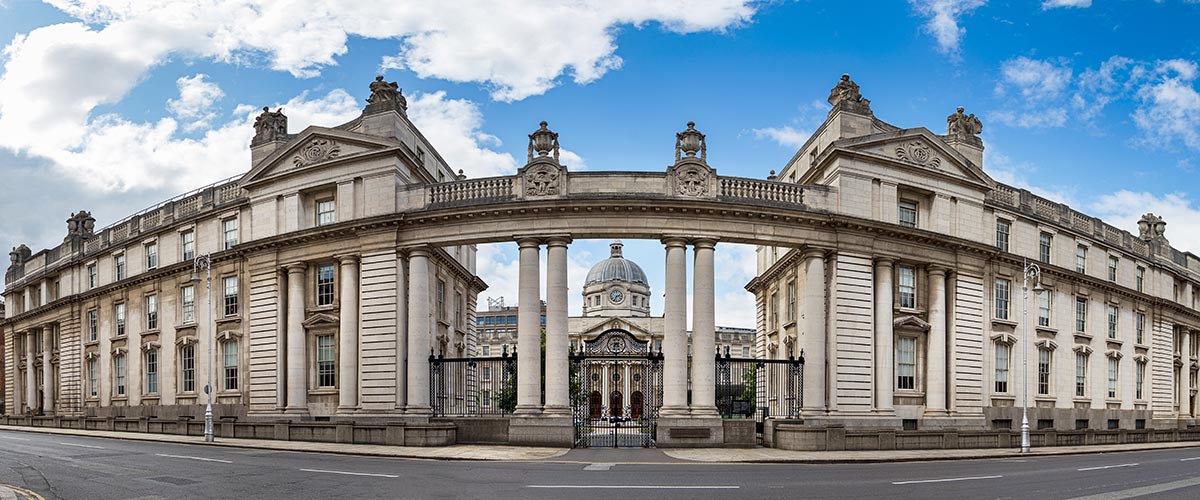On Tuesday, 7 October, the Irish government unveiled one of the most restrained budgets in recent years.
Ministers described it as “sensible,” with a focus on protecting jobs and supporting economic growth. The Budget introduces a range of measures across income tax, housing, foreign and domestic investment, financial services, and sustainability.
Personal taxes
In the area of personal and income taxes, there were a number of notable changes announced including:
- The rate of tax which applies to Irish domiciled funds, life assurance policies and equivalent offshore funds and foreign life policies will reduce from the current 41% rate to 38% from 1 January 2026.
- From 1 January 2026, the lifetime limit for Revised Entrepreneurs Relief will increase from €1 million to €1.5 million.
- The rent tax credit has been extended until the end of 2028.
- The Universal Social Charge (USC) sees an increase in the 2% rate band by €1,318 from 1 January 2026, bringing the threshold to €28,700. This ensures those individuals earning the minimum wage will not be pushed into the 3% USC band.
- Mortgage interest relief is also extended for two years, though its value will taper in the final year.
No changes were announced in relation to income tax rates, bands, or to the most commonly applicable tax credits. In addition, no changes were made to the headline rate of capital gains tax (CGT) at 33%, and no changes were made to the headline rate of capital acquisitions tax (33%) of the related lifetime tax free thresholds.
Investors will welcome the reduction in the tax rate on Irish regulated funds, offshore equivalents, and foreign life assurance products from 41% to 38%. A roadmap is expected early next year to simplify reporting for various investment types, including offshore funds and savings accounts.
Creative sector reliefs
Significant changes were announced relating to film relief under Section 481 TCA 1997 and the Digital Games Corporation Tax Credit under Section 481A TCA 1997. We analyse these changes in a separate article.
There were no changes announced relating to the artist’s exemption, however the Basic Income for the arts scheme will open a further 2,000 places following the success of the scheme since its introduction in 2022.
Innovation incentives
It was announced that the R&D tax credit will be increased from its current headline rate of 30% to 35%, a change which will be widely welcomed given concerns expressed around the competitiveness of the Irish incentive. In addition, the first-year claim threshold benefitting small claims will increase from €75,000 to €87,500.
It was also announced that an ‘R&D Compass’ will be published soon to guide future enhancements and better align the credit with industry practices.
Employment taxes
There were a number of relevant announcements relating to employment taxes including:
- The existing relief deduction from the Original Market Value (OMV) used to calculate benefit in kind (BIK) on motor vehicles is being extended to 31 December 2028, however, will reduce on a tapered basis. The current deduction of €10,000 will remain in place for 2026, reducing to €5,000 in 2027 and €2,500 in 2028.
- A new BIK category will be created for zero emission vehicles with rates of between 6%-15%.
- The Universal Social Charge (USC) sees an increase in the 2% rate band by €1,318 from 1 January 2026, bringing the threshold to €28,700.
- The Special Assignee Relief Programme (SARP) and Foreign Earnings Deduction (FED) have both been extended to 2030. SARP now requires a minimum salary of €125,000 for new entrants, while FED’s relief limit has increased to €50,000 and now includes the Philippines and Turkey.
- The Key Employee Engagement Programme (KEEP) has been extended to 31 December 2028 (subject to EU approval).
Property
Housing was a central theme in Budget 2026 and a number of measures were announced aimed at addressing the issues of chronic undersupply including:
- The VAT rate on the construction of new apartments will be reduced from 13.5% to 9%, effective from 8 October 2025 until 31 December 2030.
- Developers will benefit from an enhanced corporation tax deduction of 125% on qualifying costs for apartment development and conversion projects, with a maximum additional deduction of €50,000 per unit. This applies to projects with commencement notices issued between 8 October 2025 and 31 December 2030.
- Rental profits from cost rental activities will be exempt from corporation tax for developments designated under the Cost Rental Scheme from 8 October 2025.
- The Living City Initiative has been extended to 2030 and expanded to include residential properties built before 1975, with increased relief limits and broader regional coverage.
- The Stamp Duty Refund Scheme for large-scale residential developments is also extended, with more flexible timelines and a new “full” refund option for multi-phased projects.
- A new Derelict Property Tax will replace the Derelict Site Levy, with preliminary registers to be published in 2027. The Revenue will oversee its collection. The government has committed over €5 billion in capital investment for housing delivery in 2026, supported by Approved Housing Bodies and the Land Development Agency.
Indirect taxes
As expected, the big announcement on Budget day was that from 1 July 2026, the VAT rate on food, catering, and hairdressing services will drop to 9%. The reduced VAT rate on gas and electricity bills will remain in place until 31 December 2030.
It was also announced that Revenue will be publishing a roadmap for the introduction of B2B e-invoicing in Ireland. Revenue published ‘VAT Modernisation – Implementation of e-Invoicing in Ireland’ on the day after the Budget announcement. The roadmap provides from the mandatory introduction of e-invoicing for domestic B2B transactions from November 2028 for large corporations. The rules will be extended to other businesses and intra-EU transactions over the course of 2029 and 2030.
If you’d like further information on how Budget 2026 impacts you or your business, please get in touch with Peter Boyle.
Contact us
Director
Key experience


